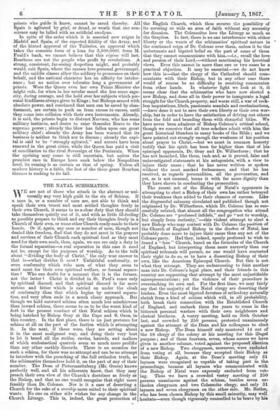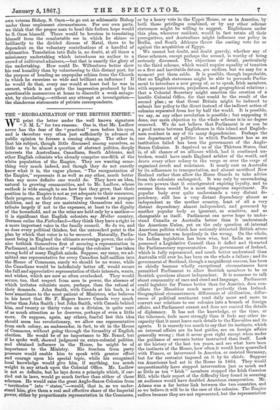THE NATAL SCHTSMATICS.
WE are not of those who attach in the abstract or uni- versally any very high guilt to the sin of Schism. If a man is, or a number of men are, not able to think and speak their own truest and most settled thoughts freely in their own Church, it seems to us a clear duty that they should take themselves quietly out of it, and with as little ill-feeling as possible prepare to think and say their thoughts freely in a Church of their own, or some other Church ready-made to their hands. Or if, again, any man or number of men, though not denied this freedom, find that they do not meet in the prayers and services of their Church such spiritual food as they most need for their own souls, then, again, we can see only a duty in the formal separation—a real separation in this case it need not be, except for the purposes of worship. As to the talk about "dividing the body of Christ," the only true answer to that is—what divides it most? Unfaithful conformity, or even conformity which robs men of what they seem to need most for their own spiritual welfare, or formal separa- tion? Who can doubt for a moment that it is the former, not the latter ? Christ is divided in St. Paul's sense only by spiritual discord, and that spiritual discord is far more serious and bitter which is carried on under the cloak of conformity than that which begins by outward separa- tion, and very often ends in a much closer approach. But though we hold outward schism often much less mischievous than inward schism, there seems to us to be the worst kind of both in the present conduct of that Natal schism which is being hatched by Bishop Gray at the Cape and S. Oxon, in this country. In the first place, there is no just pretence for schism at all on the part of the faction which is attempting it. In the next, if there were, they are setting about it in the most malignant way, and doing their very best to let it breed all the strifes, envies, hatreds, and malices of which ecclesiastical quarrels seem so mach more prolific than any other earthly discords. There is no occasion for such a schism, for there-was no attempt and can be no attempt to interfere with the preaching of the full orthodox troth, as the schismatics themselves hold it, on the part of any of their number. The Dean of Pietermaritzburg (Mr. Green) knows perfectly well, and all his adherents know, that they may preach their own view of the Church's doctrines as freely as the Bishop, and that no one would recognize that right more frankly than Dr. Colenso. Nor is it a case of deserting a Church for the sake of a worship more suited to their spiritual wants. No one on either side wishes for any change in the Church Liturgy. This is indeed, the great protection of the English Church, which thus secures the possibility of its covering so wide an area of faith without any necessity for disunion. The Colensoites love the Liturgy as much as- the Grayites. In fact, there is no one interference with either liberty or the wants of the schismatics' spiritual nature in the continued reign of Dr. Colenso over them, unless it be the- unfortunate and bigoted belief on the part of some of them that they cannot communicate with him,—i.e., recall the love' and passion of their Lord,—without sanctioning his heretical views. Even this cannot in more than one or two cases be a practical objection. It may be essential—we do not know how this is—that the clergy of the Cathedral should com- municate with their Bishop, but in any other case there would of course be no difficulty in receiving communion from other hands. In whatever light we look at it, it seems clear that the schismatics who have now elected a new Bishop, and done all in their power to inaugurate a legal struggle for the Church property, and worse still, a war of reck- less imputations, libels, passionate scandals and recriminations, —have done it not to save their own liberty or their own wor-- ship, but in order to have the satisfaction of driving out others, from the fold and branding them with shameful titles. We have never been admirers of Bishop Colenso's critical school, though we conceive that all true scholars admit with him the- great historical blunders in many books of the Bible • and we- have pointed out strongly enough the weakness of his position about prayer to Christ,—but we must in common honesty testify that his spirit has been far higher than that of his episcopal opponents, Dr. Gray and Dr. Wilberforce ; that he has not launched, like them, rash and, as it proved, false and uninvestigated statements at his antagonists, with, a view to injure their cause ; that he has never written or spoken without the most marked forbearance, and that he has received, as regards personalities, all the provocation, and. yet, as is not unusual, borne it with 'far more dignity than they have shown in conducting the prosecution.
The recent act of the Bishop of Natal's opponents in attempting to elect a Bishop of their own has rather betrayed their weakness than added to their chances of success. Like the disgraceful calumny circulated and published though not originated by Dr. Wilberforce, which Dr. Colenso has so suc- cessfully refuted, that almost all the congregation who attend Dr. Colenso are "professed infidels," and go "not to worship, but simply from curiosity,"—this violent attempt to elect_ a new Bishop who may contest with Dr. Colenso the position of the Church of England Bishop in the dioctse of Natal, has probably done more to injure their cause than any act of the Colenso party. Had they, indeed, openly professed to wish to- found a " free " Church, based on the formulas of the Church of England, but interpreting them more narrowly than our spiritual tribunals will permit, no one would have contested their right to do so, or to have a dissenting Bishop of their own, like the American Episcopal Church. But this is not what they attempt. They are endeavouring to foist another- man into Dr. Colenso's legal place, and their friends in this country are supporting that attempt by the most unjustifiable misrepresentations ; yet the violence of their procedure is- overreaching its own end. For the first time, we may fairly say that the majority of the Natal clergy are deserting their- leaders. Even the most bigoted devotees of orthodoxy naturally- shrink from a kind of schism which will, in all probability, both break their connection with the Established Church of England, and embark ,them for years to come in the bitterest personal warfare with their own neighbours and clerical brethren. A vestry meeting, held on 30th October' last, and crowded by 250 persons, protested unanimously against the attempt of the Dean and his colleagues to elect a new Bishop. The Dean himself only mustered 14 out of the 18 clergy of the colony at his meeting for this illegal purpose ; and of these fourteen, seven, whose names we have given in another column, voted against the proposed election of a new Bishop. Two clergymen, moreover, were excluded from voting at all, because they accepted their Bishop as their Bishop. Again, at the Dean's meeting only 31 laymen were recognized as capable of taking part in the proceedings, because all laymen who communicated with the Bishop of Natal were expressly excluded from vot- ing. Thus we have a crowded vestry meeting of 250 persons unanimous against the schism, besides seven or- thodox clergymen and two Colensoite clergy, and only 31 laymen and seven clergymen on the other side. Mr. Butler, who has been chosen Bishop by this small minority, may well hesitate—even though vigorously counselled to be brave by his own veteran Bishop, S. Oxon—to go out as schismatic Bishop under these unpleasant circumstances. For our own parts, we think that the proper man to head this forlorn hope would be S. Oxon himself. There would be heroism in translating himself from the comfortable see in which he shines so brilliantly to the divided diocese of Natal, there to be dependent on the voluntary contributions of a handful of schismatics. Translation into Zulu is, no doubt, at all times a missionary undertaking which introduces no author to a crowd of cultivated admirers,—but that is exactly the glory of the undertaking. How could Dr. Wilberforce better show his real humility than by volunteering to this distant post, for the purpose of heading an unpopular schism from the Church in which he exercises so wide and brilliant an influence? If he would do that, every one wouM at least feel he was in earnest, which is not quite the impression produced by his questionable manoeuvres at home to discredit a weak antago- nist, by circulating,—without any attempt at investigation— the slanderous statements of private correspondents.





































 Previous page
Previous page